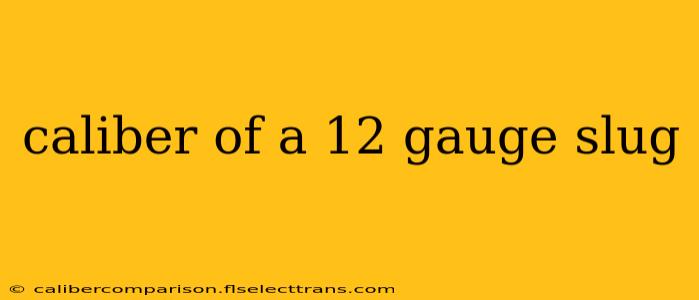The term "caliber" when discussing firearms can be a bit confusing, especially for those new to shotguns. While a rifle's caliber directly refers to the diameter of its bullet, shotguns use a different system based on gauge. So, the question "What's the caliber of a 12 gauge slug?" needs a nuanced answer. A 12-gauge shotgun doesn't have a caliber in the traditional sense; it has a gauge, and understanding this difference is crucial.
Understanding Gauge vs. Caliber
Caliber refers to the diameter of the projectile, usually expressed in inches or millimeters. For example, a .308 Winchester rifle has a bullet diameter of approximately .308 inches.
Gauge, on the other hand, refers to the number of lead balls of a specific diameter that would weigh one pound. A 12-gauge shotgun means that 12 lead balls, each the diameter of the barrel, would weigh one pound. The lower the gauge number, the larger the diameter of the barrel and the projectile it fires. Therefore, a 10-gauge shotgun has a larger barrel than a 12-gauge, and a 20-gauge is smaller still.
The Size of a 12 Gauge Slug
While a 12-gauge shotgun doesn't have a caliber, the slugs it fires do have a diameter. This diameter varies depending on the slug type. Common 12-gauge slug diameters include:
- .73 inches (approximately 18.5 mm): This is a common diameter for many rifled slugs, designed for increased accuracy.
- Around .729 inches (approximately 18.5 mm): Many smoothbore slugs will fall within this range, although accuracy is generally less than with rifled slugs.
It's important to remember that these are approximate diameters. Slight variations can exist between manufacturers and slug types.
Factors Affecting 12 Gauge Slug Performance
The lethality and range of a 12-gauge slug are influenced by several factors beyond its diameter:
Slug Type:
- Rifled slugs: These slugs have grooves machined into their surface, promoting spin stabilization for increased accuracy and range.
- Smoothbore slugs: These slugs are designed for smoothbore barrels and generally offer less accuracy at longer ranges.
- Sabot slugs: These slugs utilize a plastic sabot that fits snugly inside the barrel, providing better accuracy and reducing friction.
Powder Charge:
The amount of gunpowder used significantly affects the velocity and energy of the slug. Higher powder charges result in faster and more powerful slugs.
Barrel Length:
Longer barrels allow for more complete powder burn, increasing velocity and potentially accuracy.
Choke:
The choke of the shotgun barrel also impacts the pattern of the slug. While not as critical as with shot, a tighter choke can provide a slightly tighter grouping at longer ranges.
Conclusion: More Than Just a Number
While a 12-gauge shotgun itself doesn't have a caliber, understanding the approximate diameter of its slugs and the factors that influence their performance is crucial for safe and effective use. Choosing the right slug type and understanding its limitations is essential for any responsible 12-gauge shotgun owner. Remember to always consult your firearm's manual and follow safe gun handling practices.

